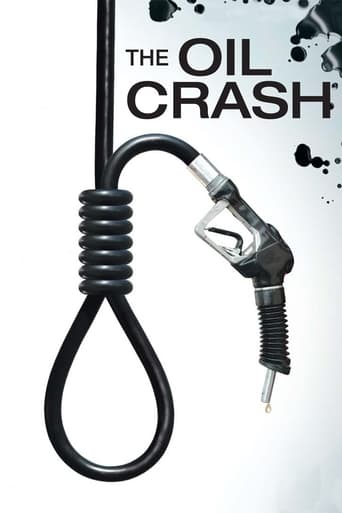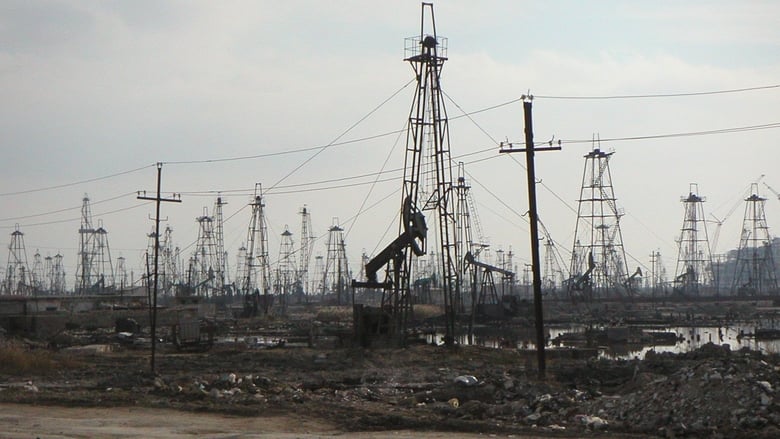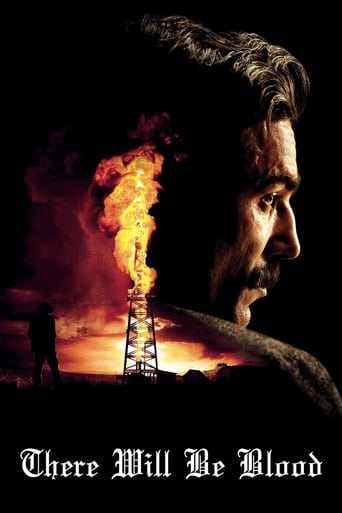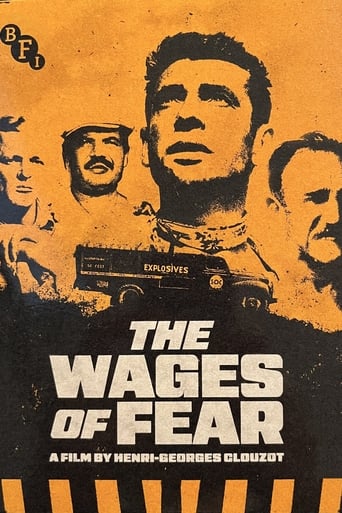

A Crude Awakening (2006)
Basil Gelpke and Ray McCormack's nonfiction treatise Crude Awakening joins Maxed Out, An Inconvenient Truth, and other recent documentaries devoted to unearthing and exploring forces that are untying the connective threads of contemporary society. The subject at hand is crude oil - specifically, the depletion of petroleum from the Earth, in an era when consumption threatens to exceed supply.
Watch Trailer
Cast
Similar titles


Reviews
Funny, strange, confrontational and subversive, this is one of the most interesting experiences you'll have at the cinema this year.
At first rather annoying in its heavy emphasis on reenactments, this movie ultimately proves fascinating, simply because the complicated, highly dramatic tale it tells still almost defies belief.
Although I seem to have had higher expectations than I thought, the movie is super entertaining.
The story, direction, characters, and writing/dialogue is akin to taking a tranquilizer shot to the neck, but everything else was so well done.
This is an excellent documentary/expose. Some of the above comments mentioned that it was not thorough enough exploring the alternatives.I disagree to that being a flaw. I did not feel alt energy was the films objective. It was merely touched on as not being explored as much as it should be at this stage in our "Carbon-based man" evolution.Alternative solutions is another extensive subject of many other documentaries and TV shows or another subject matter beyond the point presented here.And this point is long overdue to be put to the public, it was presented engagingly well in this film.The earlier reference to "3 Days of the Condor" is true (one of my old favs) and it proves that we were aware of the problem way back then, yet we continue to ignore it in the political main stage.
While this film may seem academically sound and well-researched, it does not once mention what I thought was rather widely regarded as the most practicable alternative to petroleum fuel, the conversion of coal into synthetic fuels using the Fischer-Tropsch process. This process has been around since the 1920s and has been exploited by oil starved nations such as Germany and Japan during the second world war, and by South Africa during Apartheid and after. I understand there are enormous reserves of coal in the United States alone, enough to provide such fuel for the country for at least a century. While more expensive, it cannot currently compete with the use of petroleum, and has therefore not been widely exploited. In this film, however, power from solar, Hydrogen, and wind sources are all dismissed out of hand as impracticable alternatives and cannot, or will not, be developed before we all suddenly starve, freeze, run amok, or whatever they suggest is going to happen in twenty years when oil reserves are suddenly depleted. Yet, there is no mention of a significant technology which is already in place, using a resource in rather great abundance, and whose refinement and improvement is light years from the hopelessness suggested by one of their experts, who likens the challenges we face in surviving the depletion of oil reserves to that of colonizing Pluto in ten years...
This is a movie that people should be forced to see! It is an amazing display of the facts. These are real issues that everyone is going to have to deal with! The problems are not going to be solved by pointing fingers and expecting our governments to mitigate the problem, the problem lies within us as consumers! It is time that we look to our own lives and determine how we can live with far less than we currently do. The people that can grasp this concept will be far better off than those who are stuck in the past. Relocalization, reduction, more efficient use of energy and a serious reduction in consumption are great first starts. Thanks Basil for the great movie, I look forward to your next film!
In 2004, the loud and politically motivated director Michael Moore made a splash with Fahrenheit 9/11, lambasting the Bush administration and making rude noises about the connections between oil and politics. The lack of academic rigour in his film allowed it to be dismissed as disingenuous, although it created plenty of waves in the minds of the anti-Bush camp, at least. Then in 2005, Stephen Gaghan made Syriana, a tense, well-researched, politically charged drama about the oil industry - which made plenty of sense to those steeped in world politics and economics, without outwardly offending anybody. Now in 2006 two directors in Switzerland make A Crude Awakening - The Oil Crash, a painstaking documentary about the frighteningly central role of oil in our lives. Gelpke has a background in anthropology, economics before working as a news/war reporter and then becoming involved in scientific film-making. McCormack worked in corporate film-making and documentaries but also holds an Honours Degree in Environmental Policy and Management. As you might expect, this film relies not on hearsay or fictionalised evidence, but interviews with notable academics, experts and advisors from across the political, corporate and economic spectrum. The film's official website is awash with official protocols, reports, and other evidence to help you check their sources. It has no discernible political axe to grind. In other words, it's hard to ignore.Maybe you've read a lot of literature and have made some connections. You know that the globe faces an energy crisis. Yes? Think again. If you thought it was serious, multiply that a hundred-fold and start examining it on your mother's life - or rather that of your children. If you thought there was a connection between oil and foreign policy, good or bad, stop and realise that the underlying mechanics are much deeper than that and go to the root of things you never even dreamed of. Stop, and imagine your cosy world coming to an end.A Crude Awakening starts off by calling oil 'the excrement of the devil'. That is the first and last piece of rhetoric - the rest is cold examination of evidence; which is perhaps one of the reasons it then has to work so hard to make its rather dry subject interesting . . . I was tired enough to nod off while watching it, but the cold and careful facts started seeping down my neck until I was almost in a state of shock.Oil and other fossil fuels, compared to human physical labour, is so efficient as to make it look almost free by comparison. If we take away everything around us in our modern world that has not been affected by oil in some way, from food to manufacturing (but particularly transport), there is hardly anything left. Our cities, have consequently been designed and built (unlike most of those in Asia and much of the world, that pre-date the rise of oil) around an almost never-ending supply of cheap oil. There is no 'easy going back.' With Western supplies dwindling, and the main sources being ever more in the hands of rogue or unstable governments, oil, essential to our continued way of life (and a modern way of life that developing countries would emulate), becomes a catalyst and magnet for war. From 1945, the promise of security to Saudi rulers became the exchange currency for the promise of a cheap supply of oil. Ordinary Saudis however have seen a massive drop in their quality of life, which has led to discontent and the attraction of terrorism, especially by migrating to neighbouring countries where there is are bigger power vacuums.The present lifestyle of the West, according to the range of least-to-most optimistic figures presented in the film, is impossible to maintain. This produces some bleak options. 1) militarise oil - in other words, say to people, if you want to keep your current way of life and present civilisation, be prepared for a lot of wars to secure the oil necessary; or 2) kick oil dependence, which means developing new technology. Although some of the scientists in the film try to be upbeat about never underestimating the human capacity for technology, they mercilessly dissect the present known options to show that, even with the best outcomes, the result would be the tiniest drop in the ocean of what is required.In the absence of sufficient fossil fuels, they suggest that a world population of the current size would be difficult to maintain. We have an unsustainable lifestyle. Pushed into the corner, do you want to get the bicycle to work - even if it's fifty miles away? Or do you want to say, it's a future generation's problem? Put so starkly, the neo-con solution of 'democratising the Middle East' to ensure oil supplies in a publicly acceptable (or marketable) way, sounds a more realistic me-first solution than many liberals would care to admit . . . How much world poverty and deprivation, not in third world countries but our own, can the we stomach - and how much will our children have to stomach? Would you rather not know? Or do you maybe want to see this film . . .







